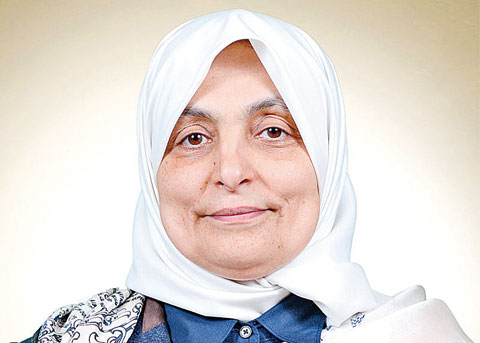 Social Affairs Minister Hind Al-Sabeeh
Social Affairs Minister Hind Al-SabeehKUWAIT: Ten public servants and 30 company representatives were arrested and referred to public prosecution in 2016 on charges of receiving huge bribes to add more laborers on fake companies' files and aid visa trafficking, according to a document issued from the office of Minister of Social Affairs and Labor and Minister of State for Economic Affairs Hind Al-Sabeeh.
Every private company in Kuwait has a file in the Public Authority for Manpower's database which stipulates the number of employees a company can hire. Based on that number, a corresponding number of work visas is issued to serve the company's labor recruitment needs. But there has been many cases in the past in which some companies managed to bribe people working in the authority and who have access to the system in order to illegally increase the number of allowed employees; which is normally given after an evaluation study for a company's needs. Visas generated by the extra slots in this case are often sold to laborers looking for a job in oil-rich Gulf countries - a practice commonly known as 'visa trafficking.'
Local authorities have taken efforts to tackle this problem over the past few years, as hundreds of people were arrested and companies closed after they were discovered to be involved in visa trafficking. Those efforts have been recognized internationally but they still fall short of being considered effective in limiting this illegal practice. "The Government of Kuwait does not fully meet the minimum standards for the elimination of trafficking but is making significant efforts to do so," reads the US Department of State's 2016 Trafficking in Persons Report, which ranks Kuwait in Tier 2 (Watch List).
In other news, minister Sabeeh reportedly gave new instructions to make it mandatory for a person to have a bachelor's degree or diploma in mechanics in order to be eligible to open a tire repair shop at any co-op society in Kuwait. Furthermore, the guidelines also stipulate that only a pharmacist who has a practicing license in Kuwait is granted a license to open a pharmacy.
Projects' requirements
Kuwait Petroleum Corporation's (KPC) Managing Director for Human Resources Bader Al-Sharad submitted the corporation's future projects' requirements of land and industrial sites to Kuwait Municipality. In a letter sent to the municipality, Sharad explained that as part of KPC's keenness on executing its strategic plan to help boost the national economy, Kuwait National Petroleum Company's (KNPC) wishes to conduct feasibility studies for projects such as expanding refineries' capacity and future petrochemical projects. Sharad explained that land was needed for expanding refining capacity by 1.7 million bpd by 2025, provided that the sites overlook the sea.
2,700 megawatts
The Ministry of Electricity and Water's (MEW) Assistant Undersecretary for Electricity Projects and Power Plants Operation and Maintenance Fouad Al-Oun said the ministry has so far accomplished over 80 percent of the maintenance operations at various power and water desalination plants, and expected producing 2,700 megawatts more than the predicted maximum power consumption during the summer. Assistant undersecretary for electricity distribution grids Jassem Allengawi stressed that his sector is well-prepared for the summer and that maintenance operations had been already done on over 20 percent of the secondary power transforming units.
Rotten fruits
The Ministry of Commerce and Industry'(MoCI) commercial control and consumer protection sector raided a factory producing fresh juices, said assistant undersecretary Eid Al-Rasheedi, noting that the factory was using rotten oranges and a large quantity of inedible fruits in the process.
By A Saleh










